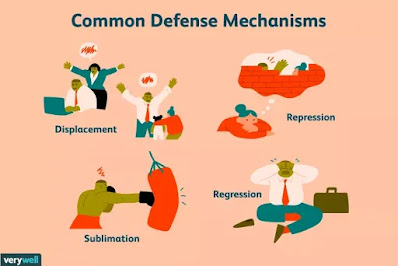In its long period of evolution, the lower ego has developed many subtle and not-so-subtle strategies to protect itself and maintain a positive self-image (and avoid the impulses from the higher ego). If they remain unconscious, they can proliferate and create a complex web of illusions and delusions. Therefore on the path of discrimination and Self-knowledge, an understanding of the modern formulations of defence mechanisms can be a useful tool. This concept is not unrelated to a previous post on logical fallacies, as they can be caused by a reaction from the defense mechanisms.
Defense mechanisms can be defined as unconscious strategies whereby people protect themselves from anxious thoughts or feelings. They aren’t necessarily bad—they can allow people to navigate painful experiences or channel their energy more productively. They become problematic, however, when applied too frequently or for too long. Most defense mechanisms are fairly unconscious. Some types of psychotherapy can help a person become aware of what defense mechanisms they are using, how effective they are, and how to use less primitive and more effective mechanisms in the future. Following certain psychologists, the list has been classified into three levels, from primitive to more sophisticated.
Primitive Defense Mechanisms
1. Dissociation
Dissociation is when a person loses track of time and/or person, and instead finds another representation of their self in order to continue in the moment. A person who dissociates often loses track of time or themselves and their usual thought processes and memories. People who have a history of any kind of childhood abuse often suffer from some form of dissociation.
2. Compartmentalization
Separating components of one’s life into different categories to prevent conflicting emotions. Also termed splitting, which is said to be occurring when positive and negative representations of self and other are dissociated from one another inside a person's mind. It is often related to early abuse and appears to be a mechanism by which people can preserve some semblance of happiness in the face of very negative experiences.
3. Projection
Attributing one’s unacceptable feelings or desires to someone else. For example, a spouse may be angry at their significant other for not listening, when in fact it is the angry spouse who does not listen. Projection is often the result of a lack of insight and acknowledgement of one’s own motivations and feelings.
4. Reaction Formation
Behaving or expressing the opposite of one’s true feelings. For instance, a man who feels insecure about his masculinity might act overly aggressive.
5. Acting Out
Acting Out is performing an extreme behavior in order to express thoughts or feelings the person feels incapable of otherwise expressing. Instead of saying, “I’m angry with you,” a person who acts out may instead throw a book at the person, or punch a hole through a wall.
6. Denial
Refusing to recognize or acknowledge real facts or experiences that would lead to anxiety. For instance, someone with substance use disorder might not be able to clearly see his problem.
Intermediate Defense Mechanisms
7. Regression
Reverting to the behavior or emotions of an earlier developmental stage.
8. Repression
Blocking difficult thoughts from entering into consciousness, such as a trauma survivor shutting out a tragic experience.
9. Displacement
Redirecting an emotional reaction from the rightful recipient to another person altogether. For example, if a manager screams at an employee, the employee doesn't scream back—but the employee may yell at her partner later that night.
10. Intellectualization
Focusing on the intellectual rather than emotional consequences of a situation. For instance, a person who has just been given a terminal medical diagnosis, instead of expressing their sadness and grief, focuses instead on the details of all possible fruitless medical procedures.
11. Rationalization
Justifying a mistake or problematic feeling with seemingly logical reasons or explanations. For instance, a woman who starts dating a man she really likes is suddenly dumped by the man. She re-imagines the situation in her mind with the thought, “I suspected he was a loser all along.”
12. Undoing
When we act on an idea or impulse that we later regret, we may adopt a defense mechanism of attempting to “undo” that action in order to protect the ego from feelings of guilt or shame. An absent father may attempt to make up for his absence by buying his children a lot of gifts occasionally.
13. Identification
Identification is when we identify ourselves with an image that we see as ideal to our ego. We associate ourselves with groups, movements, and people we see as who we wish to be.
14. Introjection
Introjection is the process in which we accept standards to be true to avoid scrutiny. This can be looked at as an extreme form of conformity.
Mature Defense Mechanisms
15. Sublimation
Channeling sexual or unacceptable urges into a productive outlet, such as work or a hobby.
16. Compensation
Compensation occurs when we do not like an aspect of our self or our behavior, and we perceive it as negative. In turn, we develop aspects and behaviors that we do in fact like about ourselves to compensate for the previously disliked concept.
17. Assertiveness
Assertiveness is a communication posture that exists between aggressiveness and passivity. Passive postured people allow others to invade them, while aggressive postured people invade other people. Assertive postured people defend themselves against the invasions of aggressive people, but do not themselves become aggressive and invade others - not even those who try to invade them. Assertiveness seems simple enough, but actually requires considerable finesse, self-confidence and a healthy and accurate understanding of social dynamics to function.
References
Falikowski, Anthony. Mastering Human Relations. Scarborough. Prentice-Hall, 1996.
www.mentalhelp.net/personality-disorders/defense-mechanisms/
psychcentral.com/lib/15-common-defense-mechanisms#Mature-Defense-Mechanisms
www.verywellmind.com/defense-mechanisms-2795960
www.psychologytoday.com/ca/basics/defense-mechanisms
www.healthline.com/health/mental-health/defense-mechanisms
www.simplypsychology.org/defense-mechanisms.html
www.tonyrobbins.com/mind-meaning/10-common-defense-mechanisms/
www.medicalnewstoday.com/articles/defense-mechanisms
www.psychologistworld.com/freud/defence-mechanisms-list



No comments:
Post a Comment